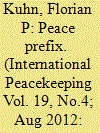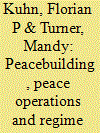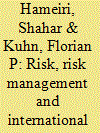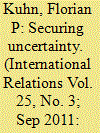|
|
|
Sort Order |
|
|
|
Items / Page
|
|
|
|
|
|
|
| Srl | Item |
| 1 |
ID:
103216


|
|
|
|
|
| Publication |
2011.
|
| Summary/Abstract |
When political actors and international relations scholars invoke 'the international community', the term is commonly framed very loosely. It is used either as a reference to the norms of international politics or, according to its composition, as a coalition of concerned actors. This article, by contrast, argues that it is the interplay of image and practice of the term's invocation that shapes its multi-faceted character. 'The international community' can be used by many different groups, state and non-state alike, to locate their political goals in the context of a wider array of values. Usually, these norms are state related and can be used to simulate political relevance. Conversely, actors defying widely accepted values can be excluded and policy against them legitimized. Addressing domestic as well as international audiences, the claim to be acting as, or on behalf of, 'the international community' is mostly virtual but has definite political consequences.
|
|
|
|
|
|
|
|
|
|
|
|
|
|
|
|
| 2 |
ID:
115318


|
|
|
|
|
| Publication |
2012.
|
| Summary/Abstract |
The Western security community has increasingly militarized its politics of peace, through peacekeeping, peace-making and other policies to which the 'peace' prefix has been attributed. Peace has become a virtual concept, which at times disguises rather violent management techniques of 'global governance'. Peace, within this framework, is a practice and a policy, mantled by a narrative of a liberal, and teleological, desire for non-violence. Non-violence towards the governing institutions became viewed as peace, advancing the notion of 'peace-as-order'. A teleology of liberal development helped to securitize the 'not-yet-liberalized Other', excluding non-liberal concepts from the idea of peace. Like the baby thrown out with the bathwater, peace lost its emancipatory content. A particular peace is the result, which includes transitional justice or reconciliation as rhetorical devices for its legitimization. However, the practice of 'peace' leaves these processes to the 'losers'; lasting peace between equals remains elusive and the politics of peace an exercise in managing security.
|
|
|
|
|
|
|
|
|
|
|
|
|
|
|
|
| 3 |
ID:
115317


|
|
|
| 4 |
ID:
143563


|
|
|
|
|
| Summary/Abstract |
Resilience’ has quickly risen to prominence in international security and development circles. In recent years it has found its way into political discourse on state building and state fragility, triggering a vast but often conceptually indistinct examination of the subject. Given its meaning in policy publications and guidelines, ‘resilience’ tends to eschew a static conceptualisation of statehood, turning instead to a more dynamic, complex and process-oriented rendering of state–society relations. This illustrates a conceptual shift from ‘failed states’ to ‘fragile states and situations’. It also transforms the concept of ‘failed state’ as a mere threat perception – with ‘stability’ as its logical other – into ‘fragility’ as a particular form of social and political risk. This paper analyses the concepts in 43 policy papers, focusing on the nexus of ‘resilience’ and ‘fragility’ in international state building, and assesses potential consequences. What does ‘resilience’ – as the opposite vision to ‘fragility’ – in fact mean? What is the practice derived from this chimerical state of states?
|
|
|
|
|
|
|
|
|
|
|
|
|
|
|
|
| 5 |
ID:
108055


|
|
|
| 6 |
ID:
108062


|
|
|
|
|
| Publication |
2011.
|
| Summary/Abstract |
The theoretical concept John Herz called a 'security dilemma' has rarely been applied to sub-state social figurations, although security dilemmas do shape political behaviour in post-conflict peacebuilding. Comparable to state formation, sub-state groups develop institutional capacities. Often led by 'warlords' or 'strongmen', these entities resemble states within, while lacking recognition and legitimacy from without. Between these entities arises a sub-sovereign form of security dilemma. It is a result of uncertainty about the other's motives regarding expansion, control of sources of funding, or domination within the legal order of the 'state'. When statebuilding is pursued by external actors, aiming to fill the legal void, the 'state' can become a source of existential risks for sub-state entities. Risks - from extinction to the transformation of a group's socio-political identity - can stem from another sub-state group taking over the state, appropriating superior means of coercion and hence enabling itself to subjugate others; relative deprivation concerning external funding or revenue from trade or smuggling; or loss of investment in networks of patronage, favourable terms of trade, or monopolies for certain goods. External support adds considerable uncertainty about interventionists' capabilities, willingness and ability to steer and control statebuilding efforts. This article explores how risks and their perception shape interaction between social actors and at the same time how awareness and consideration of these risks may influence external actors' behaviour. It argues that understanding risk constellations within an intervention and their processual transformation is vital for external statebuilding support.
|
|
|
|
|
|
|
|
|
|
|
|
|
|
|
|
|
|
|
|
|